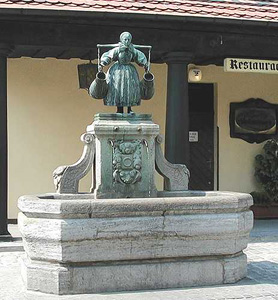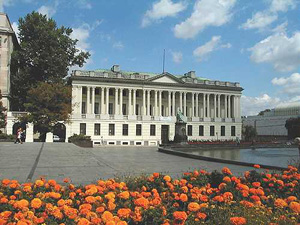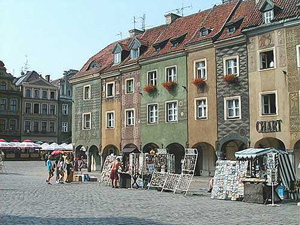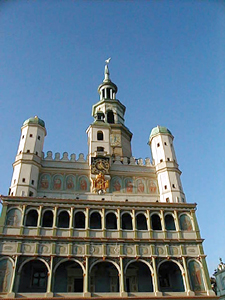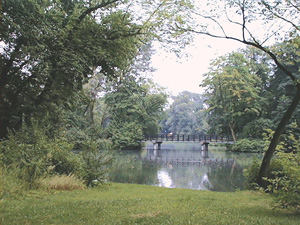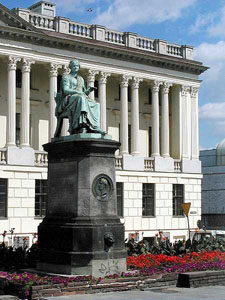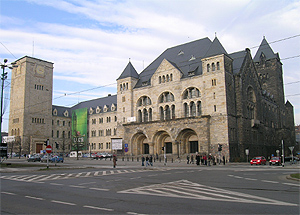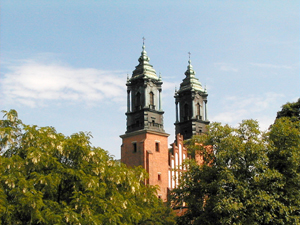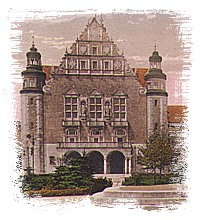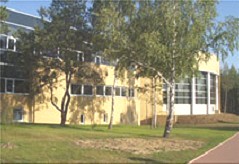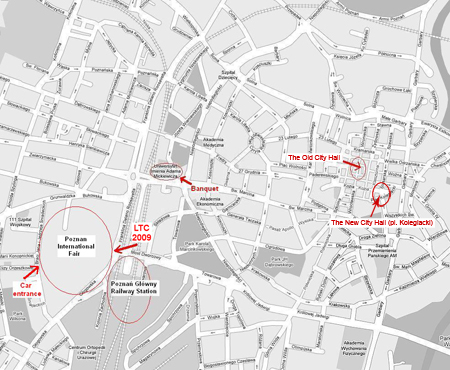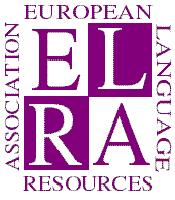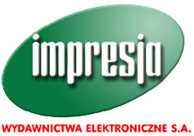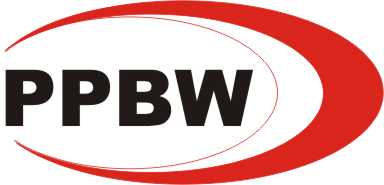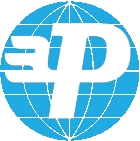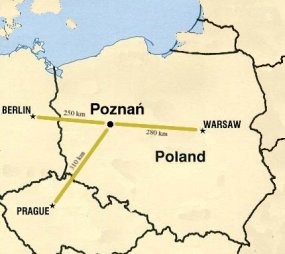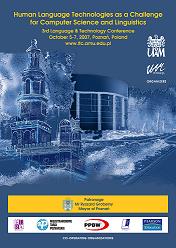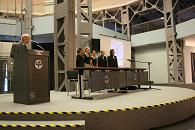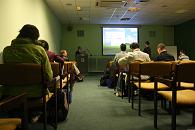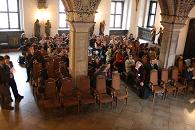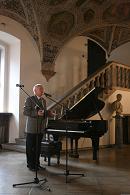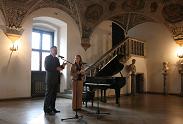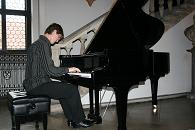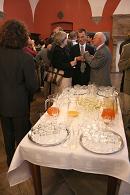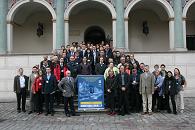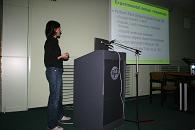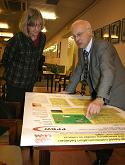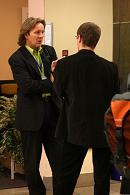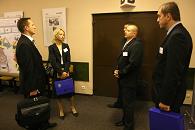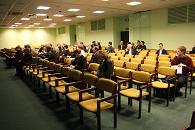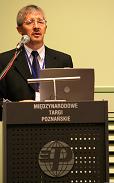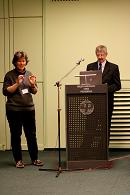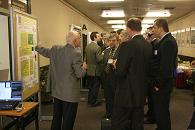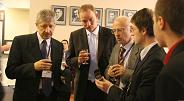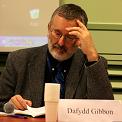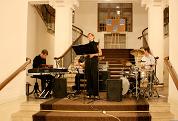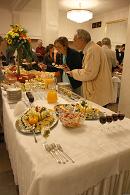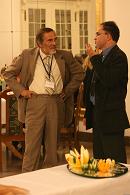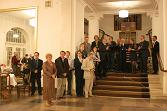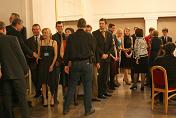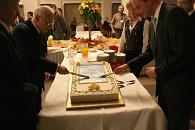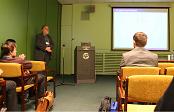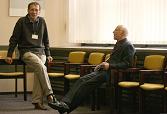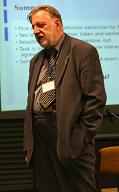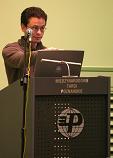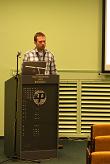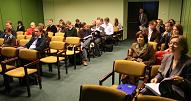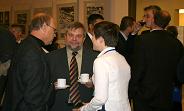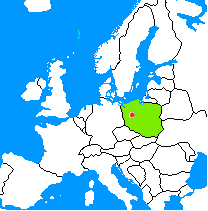| Day 1: Friday, October 5 |
| 09:15-10:45 |
| Information Retrieval/Extraction 1 (IR1) |
| IR1-1 |
On the Selection of Negative Examples for Hierarchical Text Categorization |
Tiziano Fagni, Fabrizio Sebastiani |
| IR1-2 |
Classifying texts through natural language parsing and semantic
filtering |
Jacques Chauché, Violaine Prince |
| IR1-3 |
Detecting Subject-Shift based on Keygraph for Topic
Tracking |
Fumiyo Fukumoto, Yoshimi Suzuki |
| IR1-4 |
Exploring the Structure of Broadcast News for Topic
Segmentation |
Rui Amaral, Isabel Trancoso |
| Computational Morphology 1 (MR1) |
| MR1-1 |
VerbTagGr, Web-based Tool for Statistical Morphosyntactic
Recognition of One-word Modern Greek Standard Verb Forms |
Penelope Lembessi, Stavroula Kroustalli, Maria Gregoriadou |
| MR1-2 |
Extraction of Macedonian Nominal Diminutives |
Aleksandar Petrovski, Katerina Zdravkova |
| MR1-3 |
Containing overgeneration in Zulu computational morphology |
Laurette Pretorius, Sonja E Bosch |
| MR1-4 |
A relational model of Polish inflection |
Marcin Woliński |
| Speech processing 1 (SP1) – resources |
| SP1-1 |
Annotation of Polish spoken dialogs in LUNA project |
Agnieszka Mykowiecka, Krzysztof Marasek, Małgorzata Marciniak,
Joanna Rabiega-Wiśniewska, Ryszard Gubrynowicz |
| SP1-2 |
Creating Large Speech Databases via the WWW -- the System
Architecture of the German Ph@ttSessionz Web Application |
Christoph Draxler, Klaus Jänsch |
| SP1-3 |
Triphone Statistics for Polish Language |
Bartosz Ziółko, Jakub Gałka, Suresh Manandhar, Richard C.
Wilson, Mariusz Ziółko |
| SP1-4 |
Digital Talking Books in Multiple Languages and Varieties |
Isabel Trancoso, António Serralheiro, Diamantino Caseiro, Céu
Viana, Isabel Mascarenhas |
| 11:00-12:30 |
| Information Retrieval/Extraction 2 (IR2) |
| IR2-1 |
Iterative Person Coreference Using Name Frequency
Estimates |
Octavian Popescu, Bernardo Magnini |
| IR2-2 |
A Decision Tree and Rule-based Learning Model for Anaphora
Resolution in Turkish |
Savaş Yildirim, Yilmaz Kiliçaslan, Tuğba Yildiz |
| IR2-3 |
User Evaluation of a novel technique for word-order error
correction |
Theologos Athanaselis, Konstantinos Mamouras, Stelios
Bakamidis, Ioannis Dologlou |
| IR2-4 |
Resources for Information Extraction from Polish texts |
Agnieszka Mykowiecka, Anna Kupść, Małgorzata Marciniak, Jakub
Piskorski |
| Computational Semantics 1 (SE1) |
| SE1-1 |
Extended Similarity Test for the Evaluation of Semantic Similarity Functions
|
Maciej Piasecki, Stanisław Szpakowicz, Bartosz Broda
|
| SE1-2 |
An ontology based semantic library catalogue
|
Dariusz Daćko, Joanna Józefowska, Agnieszka Ławrynowicz
|
| SE1-3 |
Mapping out a Semantic Network of Japanese Word Associations through a Combination of Recurrent Markov Clustering and Modularity
|
Maki Miyake, Terry Joyce
|
| SE1-4 |
Enhancing SIMPLE Semantic Relations: A Proposal
|
Nilda Ruimy
|
| Speech processing 2 (SP2) – recognition |
| SP2-1 |
Fuzzy Recall and Precision for Speech Segmentation
Evaluation |
Bartosz Ziółko, Suresh Manandhar, Richard C. Wilson |
| SP2-2 |
A Knowledge based Approach Using Fuzzy Inference Rules for
Vowel Recognition |
Hrudaya Ku. Tripathy, P. K. Das, B.K. Tripathy |
| SP2-3 |
Application of slope transformation to robust extraction of
parameters for speech recognition |
Szymon Drgas, Adam Dąbrowski |
| SP2-4 |
A study on bilingual speech recognition involving a minority
language |
Míriam Luján, Carlos D. Martínez, Vicent Alabau |
| 15:30-17:00 |
| Communication 1 (CO1) |
| CO1-1 |
Application of MCL in a dialog agent
|
Darsana P. Josyula, Scott Fults, Michael L. Anderson, Shomir Wilson, Don Perlis
|
| CO1-2 |
Dialog Management for Decision Processes
|
Paul Fodor
|
| CO1-3 |
An approach to processing of user's commands in human-machine interaction
|
Milan Gnjatović, Dietmar Rösner
|
| CO1-4 |
Centering-Theory-Based Text Planning of a Conjunctive Query
|
Paolo Dongilli
|
| WordNet Special Track 1 (WN1) |
| WN1-1 |
Leveraging parallel corpora and existing wordnets for automatic construction of the Slovene wordnet
|
Darja Fišer
|
| WN1-2 |
WordNet Translator: First Steps in Automatic Translation of an English Semantic Database into Polish
|
Leszek Bajkowski
|
| WN1-3 |
PolNet - Polish WordNet project algorithm
|
Zygmunt Vetulani, Justyna Walkowska, Tomasz Obrębski, Paweł Konieczka, Przemysław Rzepecki, Jacek Marciniak
|
| Speech processing 3 (SP3) – systems |
| SP3-1 |
Flexible Natural Language Generation in Multiple Contexts |
Caroline Cullen, Ian O'Neill, Philip Hanna |
| SP3-2 |
Spoken Language Interface for Mobile Devices |
João Freitas, António Calado, Maria João Barros, Miguel Sales
Dias |
| SP3-3 |
Festival Based Maiden TTS System for Tamil Language |
Sreekanth Majji, Ramakrishnan A. G. |
| SP3-4 |
Natural Language Processing for Tamil TTS |
A. G. Ramakrishnan, Lakshmish N. Kaushik, Laxmi Narayana M. |
| 17:30-19:00 |
| Communication 2 (CO2) |
| CO2-1 |
Main principles of authoring educational hypermedia: lessons learned from the construction of the Web-resource "Russian Dialectal Phonetics"
|
Galina Kedrova, Valentine Kolybasova
|
| CO2-2 |
Recognition of signed Polish words using visually-oriented subunits
|
Tomasz Kapuściński, Marian Wysocki
|
| CO2-3 |
From language to pictorial representations
|
Gérard Ligozat, Jakub Nowak, Didier Schmitt
|
| CO2-4 |
Context Identification: A Relational Database Approach
|
Zsolt T. Kardkovács, Katalin E. Lejtovicz, Gábor Kovács
|
| WordNet Special Track 2 (WN2) |
| WN2-1 |
Automatically converting and enriching a computational lexicon Ontology for NLP semantic tasks
|
Antonio Toral, Monica Monachini, Rafael Muñoz
|
| WN2-2 |
Random-Walk Models of Term Semantics: An Application to Opinion-Related Properties
|
Andrea Esuli, Fabrizio Sebastiani
|
| WN2-3 |
Putting Semantics into WordNet's "Morphosemantic" Links
|
Christiane Fellbaum, Anne Osherson, Peter E. Clark
|
| Speech processing 4 (SP4) – algorithms |
| SP4-1 |
Modelling acoustic parameters of prosody in Slovak using
Classification and Regression trees |
Milan Rusko, Marián Trnka, Sachia Darjaa, Richard Kováč |
| SP4-2 |
Perception Experiments for Effective Unit replacement for Tamil
TTS |
A. G. Ramakrishnan, Laxmi Narayana M. |
| SP4-3 |
MVDR Spectral Estimation for DCT based Pitch Modification |
R. Muralishankar, M. Ravi Shanker, A. G.
Ramakrishnan |
| SP4-4 |
The relation between the structure and prosody of complex sentences in
Hungarian
|
Ilona Koutny |
| Day 2: Saturday, October 6 |
| 08:30-09:30 |
| Digital Language Resources 1 (RS1) |
| RS1-1 |
PredicateDB: A tool for assisting the creation of a lexicon-grammar of
Predicative Nouns |
Mohamed Mahdi Malik, Jean Royauté |
| RS1-2 |
Extracting Collocations in Contexts |
Amalia Todirascu, Christopher Gledhill, Dan Stefanescu |
| RS1-3 |
Argument co-occurrence matrix as a description of verb
valence |
Łukasz Dębowski, Marcin Woliński |
| Computational Semantics 2 (SE2) |
| SE2-1 |
ARDICO: an Arabic Termino-Ontological Resource Dedicated to Children Education
|
Aroua Torjmen, Mohamed Ben Ahmed, Elisabeth Métais
|
| SE2-2 |
A Semantically Oriented Readability Checker for German
|
Tim vor der Brück, Sven Hartrumpf
|
| SE2-3 |
Extracting coordinate terms from newspaper articles and patent documents
|
Yoshimi Suzuki, Fumiyo Fukumoto
|
| Parsing 1 (PR1) |
| PR1-1 |
Efficient parsing using recursive transition networks with output
|
Javier M. Sastre, Mikel L. Forcada
|
| PR1-2 |
Innovative use of parameters in DCG-like logic grammars
|
Janusz S. Bień
|
| PR1-3 |
Robustness Evaluation of Two CCG, a PCFG and a Link Grammar Parsers
|
Tuomo Kakkonen
|
| 10:45-12:15 |
| Digital Language Resources 2 (RS2) |
| RS2-1 |
Toward a Standard Lexical Resource in the Bio Domain |
Valeria Quochi, Riccardo Del Gratta, Eva Sassolini, Monica
Monachini, Nicoletta Calzolari |
| RS2-2 |
LMF-QL: A Graphical Tool to Query LMF databases |
Mehdi Ben Abderrahmen, Bilel Gargouri, Mohamed Jmaiel |
| RS2-4 |
Novelty extraction from special and parallel corpora |
Elżbieta Dura, Barbara Gawrońska |
| Computational Semantics 3 (SE3) |
| SE3-1 |
Automatic Acquiring of Semantic Relations From Text Collection
|
Wiktor Dernowicz
|
| SE3-2 |
The DANTE Temporal Expression Tagger
|
Paweł Mazur, Robert Dale
|
| SE3-3 |
Capturing The Meaning of Time Expressions — A Functional Approach
|
Petr Nĕmec
|
| SE3-4 |
The structure of verbal sequences analyzed with unsupervised learning techniques
|
Catherine Recanati, Nicoleta Rogovschi, Younes Bennani
|
| Parsing 2 (PR2) |
| PR2-1 |
A Hybrid System for Named Entity Metonymy Resolution
|
Caroline Brun, Maud Ehrmann, Guillaume Jacquet
|
| PR2-2 |
Heuristic Disambiguation of Deverbal Nominals in Greek |
Vassiliki Rentoumi, Stasinos Konstantopoulos
|
| PR2-3 |
SPADE: Shallow Parsing and Disambiguation Engine
|
Adam Przepiórkowski, Aleksander Buczyński
|
| PR2-4 |
The Polsyn Parser
|
Nina Suszczańska, Krzysztof Simiński
|
| 14:00-14:15 |
| Presentation of Polish Platform for Homeland Security |
| HSP-0 |
Polish Platform for Homeland Security (abstract) |
Emil Pływaczewski, Zbigniew Rau |
| 14:15-15:00 |
| Applications for Homeland Security (HSP) |
| HSP-1 |
Intelligent Awareness: Event Extraction, Information Evaluation
& Risk Assessment |
Philippe Capet, Thomas Delavallade, Julien Jacquelinet, Claude
Martineau, Takuya Nakamura, Aude Rebotier, Ágnes Sándor,
Stavroula Voyatzi |
| HSP-2 |
On the Modelling of Money Laundering Techniques as Courses of
Events |
Jacek Martinek, Czesław Jędrzejek |
| HSP-3 |
Towards the Homeland Security Topical Ontology - a Core Layer
Specification |
Jolanta Cybulka |
| 15:00-15:45 |
| Polish Platform for Homeland Security Poster Presentations (PO1) |
| PO1-1 |
Cryptographic algorithms for efficient security of data flow in information system
|
Tomasz Bilski, Krzysztof Bucholc, Krzysztof Chmiel, Tadeusz Gajewski, Anna Grocholewska-Czuryło, Ewa Idzikowska, Janusz Stokłosa
|
| PO1-2 |
Multimedia System Supporting Identification and Combating Crime and Terrorism
|
Andrzej Czyżewski, Piotr Szczuko
|
| PO1-3 |
Emergency telephone conversations database with signal analysis, classification, and identification facilities
|
Adam Dąbrowski, Szymon Drgas
|
| PO1-4 |
Verbal information processing and speech recognition technologies in internal security systems
|
Grażyna Demenko, Stefan Grocholewski
|
| PO1-5 |
Intelligent Search Engine for Court Records Based on Text Processing Experience
|
Andrzej Dziech, Tomasz Ruść, Remigiusz Baran, Andrzej Zeja
|
| PO1-6 |
PPBW - Knowledge and information management in high security level services
|
Gerard Frankowski, Cezary Mazurek, Norbert Meyer, Maciej Stroiński, Marcin Wolski
|
| PO1-7 |
A tool supporting investigation procedures by means of automatic reasoning
|
Czesław Jędrzejek, Jarosław Bąk, Maciej Falkowski, Jacek Martinek, Arkadiusz Ryś
|
| PO1-8 |
Information Extraction Tools for Polish Text
|
Wiesław Lubaszewski
|
| PO1-9 |
Application of Artificial Intelligence Methods and Agent-based Technologies to Support Investigatory Activities and Proof Procedures with Emphasis on Internet Crimes
|
Edward Nawarecki, Grzegorz Dobrowolski
|
| PO1-10 |
A mobile, network-centric system of supporting police operational work
|
Mikołaj Sobczak
|
| PO1-11 |
Natural-language-based communication between human users and emergency center in critical situations. POLINT-112
|
Zygmunt Vetulani
|
| Demo Session (DEMO) |
| DEMO-1 |
Intelligent Awareness: Event Extraction, Information Evaluation & Risk Assessment (HSP-1 demonstration)
|
Philippe Capet, Thomas Delavallade, Julien Jacquelinet, Claude Martineau, Takuya Nakamura, Aude Rebotier, Ágnes Sándor, Stavroula Voyatzi
|
| DEMO-2 |
Novelty extraction from special and parallel corpora (RS2-4 demonstration)
|
Elżbieta Dura, Barbara Gawrońska
|
| DEMO-3 |
Translation applications under the SisHiTra framework (MT1-2 demonstration)
|
J. González Rubio, J. González, Antonio L.
Lagarda, A. Giménez, J. R. Navarro,
F. Casacuberta |
| DEMO-4 |
DEB Platform tools for effective development of WordNets in application to PolNet
|
Aleš Horák, Karel Pala, Tomasz Obrębski, Przemysław Rzepecki, Paweł Konieczka, Jacek Marciniak, Adam Rambousek, Zygmunt Vetulani, Justyna Walkowska
|
| DEMO-5 |
The DANTE Temporal Expression Tagger (SE3-2 demonstration)
|
Paweł Mazur, Robert Dale
|
| DEMO-6 |
New Polish tests for measuring speech intelligibility
|
Edward Ozimek, Dariusz Kutzner, Aleksander Sęk, Andrzej Wicher
|
| DEMO-7 |
Software "Self-Tutor for Foreign Languages"
|
Pavel Pankov, Polina Dolmatova
|
| DEMO-8 |
Environment Supporting Construction of the Polish Wordnet
|
Maciej Piasecki, Paweł Koczan
|
| DEMO-9 |
A DCG account of Polish relative constructions (PR4-2 demonstration)
|
Marek Świdziński
|
| DEMO-10 |
PolNet project methodology and results - demo
|
Zygmunt Vetulani, Paweł Konieczka, Jacek Marciniak, Tomasz Obrębski, Justyna Walkowska
|
| DEMO-11 |
POLINT 112-SMS
|
Zygmunt Vetulani, Krzysztof Sielski, Mariusz Tański
|
| 16:00-17:00 |
| Open Panel Discussion: Human Language Technologies in Application to Homeland Security - Vision and Prospects |
| PANEL-1 |
Chairman's Statement
(PDF) |
Dafydd Gibbon |
| Day 3: Sunday, October 7 |
| 09:00-10:30 |
| Digital Language Resources 3 (RS3) |
| RS3-1 |
"Die Fackel" and "Der Brenner": Online Digital Editions of
Literary Journals in the "AAC - Austrian Academy Corpus" |
Hanno Biber, Evelyn Breiteneder, Karlheinz Mörth |
| RS3-2 |
Construction of Text Corpus of Polish Using the Internet |
Sławomir Kulików |
| RS3-3 |
A Corpus and Lexical Resources for Multi-word Terminology
Extraction in the Field of Economy in a Minority Language |
Fco. Mario Barcala Rodríguez, Eva Domínguez Noya, Pablo
Gamallo Otero, Marisol López Martínez, Eduardo Miguel Moscoso Mato,
Guillermo Rojo, María Paula Santalla del Río, Susana Sotelo
Docío |
| Information Retrieval/Extraction 3 (IR3) |
| IR3-2 |
A Survey on Human Language Technology Terminology |
Gabriella Pardelli, Manuela Sassi, Sara Goggi |
| IR3-3 |
Automatically Determining Attitude Type and Force for Sentiment
Analysis |
Shlomo Argamon, Kenneth Bloom, Andrea Esuli, Fabrizio Sebastiani, |
| IR3-4 |
Developing a Definitional Knowledge Extraction System |
Rodrigo Alarcón, Gerardo Sierra, Carme Bach |
| Language Formalisms 1 (FO1) |
| FO1-1 |
Applying pregroups for natural language processing |
Aleksandra Kiślak-Malinowska |
| FO1-2 |
From TYn to DRT: an implementation |
Patrick Blackburn, Sebastien Hinderer |
| FO1-3 |
An algebraic approach of the Chinese sentence with Pregroups |
Daniela Bargelli |
| 11:30-13:00 |
| Information Retrieval/Extraction 4 (IR4) |
| IR4-1 |
LSA as an associative text retrieval tool |
Agnieszka Figiel |
| IR4-2 |
Result Aggregation for Knowledge-Intensive Multicultural Name
Matching |
Keith J. Miller, Mark Arehart |
| IR4-3 |
Usability of String Distance Metrics for Name Matching Tasks in
Polish |
Jakub Piskorski, Marcin Sydow |
| Computational Morphology 2 (MR2) |
| MR2-1 |
ROG - A Paradigmatic Morphological Generator for Romanian |
Elena Irimia |
| MR2-2 |
Grammar-Based Speech and Word splitting |
Ildar Kagirov, Anastasia Leontyeva |
| MR2-3 |
Treatment of Numerals in Text Processing |
Cvetana Krstev, Duško Vitas |
| MR2-4 |
Building a morphosyntactic lexicon and a pre-syntactic
processing chain for Polish |
Benoît Sagot |
| Parsing 3 (PR3) |
| PR3-1 |
Syntactic spreadsheets. In search for a human-readable representation of parse tree forests.
|
Janusz S. Bień
|
| PR3-2 |
Reducing the Number of Resulting Parsing Trees for the Czech Language Using the Beautified Chart Method
|
Vojtĕch Kovář, Aleš Horák
|
| PR3-3 |
Efficient Encoding of Parsed Natural Language Text
|
Jakub Swacha
|
| PR3-4 |
Using of the Constituent Context Model to Induce a Grammar for a Free Word Order Language: Persian
|
Seyed Abolghassem Mirroshandel, Gholamreza Ghassem-Sani, Mohamadali Honarpisheh
|
| 14:15-16:00 |
| Machine Translation 1 (MT1) |
| MT1-1 |
Data Sparsity Reduction in Statistical Machine Translation From
Highly Inflected Language to English |
Mirjam Sepesy Maučec, Janez Brest |
| MT1-2 |
Translation applications under the SisHiTra framework |
J. González Rubio, J. González, A. L.
Lagarda, A. Giménez, J. R. Navarro,
F. Casacuberta |
| MT1-3 |
The contribution of hapax legomena to word alignment |
Adrien Lardilleux, Yves Lepage |
| MT1-4 |
Using a Treebank Grammar for the Syntactical Annotation of
German Lexical Phrases |
Marcin Junczys-Dowmunt, Filip Graliński |
| MT1-5 |
The Use of Syntactic and Semantics Valences of the Verb for
Formal Delimitation of Verb Word Phrases |
Ali Abbasov, Abulfat Fatullayev |
| Parsing 4 (PR4) |
| PR4-1 |
On the evaluation of Polish definition extraction grammars
|
Adam Przepiórkowski, Łukasz Degórski, Beata Wójtowicz
|
| PR4-2 |
A DCG account of Polish relative constructions
|
Marek Świdziński
|
| PR4-3 |
Disfluency Detection and Parsing of Transcribed Speech of Estonian
|
Kaili Müürisep, Helen Nigol
|
| PR4-4 |
Mining Parsing Results for Lexical Corrections
|
Lionel Nicolas, Jacques Farré, Éric de la Clergerie
|
| PR4-5 |
A Model for Processing Procedural Texts Parsing
|
Estelle Delpech, Patrick Saint Dizier
|
| Information Retrieval/Extraction 5 (IR5) |
| IR5-1 |
Web based Factoid type Question Answering System For Tamil
Documents - A Term Based Approach |
S Lakshmana Pandian, T.V. Geetha |
| IR5-2 |
Analogies of form between chunks in Japanese are massive and
far from being misleading |
Yves Lepage, Julien Migeot, Erwan Guillerm |
| IR5-3 |
Semi-Automatic Creation of a Dictionary of Nominal
Compounds |
Tomasz Stępień, Bartosz Podlejski |
| Ali Abbasov (National Academy of Sciences of Azerbaijan, Dept. Computer Science) |
| Vicent Alabau (Instituto Tecnologico de Informatica, Departamento de Sistemas Informaticos y Computacion, Universidad Politecnica de Valencia) |
| Rodrigo Alarcón (Instituto de Ingeniería,UNAM) |
| Rui Amaral (Instituto Superior Técnico; Instituto Politécnico de Setúbal; L2F - Spoken Language Systems Lab, INESC-ID) |
| Michael L. Anderson (Franklin and Marshall College; University of Maryland) |
| Mark Arehart (MITRE Corpotarion) |
| Shlomo Argamon (Linguistic Cognition Laboratory – Department of Computer Science
Illinois Institute of Technology) |
| Theologos Athanaselis (Institute for Language and Speech Processing, Athens) |
| Carme Bach (Instituto Universitario de Lingüística Aplicada, Universidad Pompeu Fabra) |
| Leszek Bajkowski (NKJO Jagiellonian University) |
| Stelios Bakamidis (Institute for Language and Speech Processing, Athens) |
|
Remigiusz Baran (AGH University of Science and Technology)
|
| Fco. Mario Barcala Rodríguez (Centro para a
Investigación en Humanidades Ramón Piñeiro) |
| Daniela Bargelli (McGill University, Montreal, Canada) |
| Maria João Barros (DEETC- ISEL, Polytechnic Institute of Lisbon,) |
| Jarosław Bąk (Institute of Control and Information Engineering, Poznań University of Technology) |
| Mehdi Ben Abderrahmen (ReDCAD) |
| Mohamed Ben Ahmed (RIADI laboratory, National School of Computer Sciences, 2010,
University of La Manouba) |
| Younes Bennani (LIPN - UMR 7030;
CNRS - Université Paris 13) |
| Hanno Biber (AAC - Austrian Academy Corpus,
Austrian Academy of Sciences) |
| Janusz S. Bień (Department of Formal Linguistics
Warsaw University) |
| Tomasz Bilski (Poznań University of Technology) |
| Patrick Blackburn (INRIA Lorraine, UHP Nancy) |
| Kenneth Bloom (Linguistic Cognition Laboratory – Department of Computer Science
Illinois Institute of Technology) |
| Sonja E Bosch (Department of African Languages, University of South Africa) |
| Evelyn Breiteneder (AAC - Austrian Academy Corpus,
Austrian Academy of Sciences) |
| Janez Brest (Computer Architecture and Languages Laboratory
Faculty for Electrical Engineering and Computer Science, University of Maribor) |
| Bartosz Broda (Institute of Applied Informatics, Wrocław University of Technology,) |
| Tim vor der Brück (Intelligent Information and Communication Systems (IICS)
FernUniversit¨at in Hagen) |
| Caroline Brun (Xerox Research Centre Europe) |
| Krzysztof Bucholc (Poznań University of Technology) |
| Aleksander Buczyński (Institute of Computer Science, Polish Academy of Sciences) |
| António Calado (Microsoft Language Development Center) |
| Nicoletta Calzolari (Istituto di Linguistica Computazionale, CNR) |
| Philippe Capet (THALES Land & Joint Systems) |
| F. Casacuberta (Dpto. de Sistemas Informáticos y Computación - Univ. Politécnica de Valencia) |
| Diamantino Caseiro (INESC ID and IST) |
| Jacques Chauché (University of Montpellier 2 and LIRMM-CNRS) |
| Krzysztof Chmiel (Poznań University of Technology) |
| Peter E. Clark (Boeing Company) |
| Caroline Cullen (The Institute of Electronics, Commerce and Information Technology
Queen’s University of Belfast) |
| Jolanta Cybulka (Institute of Control and Information Engineering, Poznań University of Technology) |
| Andrzej Czyżewski (Multimedia Systems Department,
Faculty of Electronics, Telecommunications and Informatics, Gdansk University of Technology) |
| Dariusz Daćko (Poznań University of
Technology) |
| Robert Dale (Centre for Language Technology
Macquarie University) |
| Sachia Darjaa (Institute of Informatics of the Slovak Academy of Sciences) |
| P. K. Das (Department of Computer Science & Engineering, Indian Institute of Technology Guwahati) |
| Adam Dąbrowski (Poznan University of Technology, Chair of Control and Systems Engineering) |
| Łukasz Degórski (Institute of Computer Science, Polish Academy of Sciences) |
| Éric de la Clergerie (Project ATOLL, INRIA Rocquencourt) |
| Thomas Delavallade (THALES Land & Joint Systems) |
| Riccardo Del Gratta (Istituto di Linguistica Computazionale, CNR) |
| Estelle Delpech (IRIT-CNRS) |
| Grażyna Demenko (Adam Mickiewicz University) |
| Wiktor Dernowicz (Jagiellonian University) |
| Łukasz Dębowski (Polish Academy of Sciences) |
| Grzegorz Dobrowolski (Department of Computer Science, AGH University of Science and Technology) |
| Polina Dolmatova (Kyrgyz-Russian Slavic University) |
| Ioannis Dologlou (Institute for Language and Speech Processing, Athens) |
| Eva Domínguez Noya (Centro para a Investigación en
Humanidades Ramón Piñeiro) |
| Paolo Dongilli (KRDB Center
Faculty of Computer Science
Free University of Bozen-Bolzano) |
| Szymon Drgas (Poznan University of Technology, Chair of Control and Systems Engineering) |
| Christoph Draxler (Institute of Phonetics and Speech Processing
Ludwig-Maximilian-University Munich) |
| Elżbieta Dura (University of Skövde) |
|
Andrzej Dziech (AGH University of Science and Technology)
|
| Maud Ehrmann (Xerox Research Centre Europe) |
| Andrea Esuli (Istituto di Scienza e Tecnologie
dell'Informazione, Consiglio Nazionale delle Ricerche) |
| Tiziano Fagni (Istituto di Scienza e Tecnologie
dell'Informazione, Consiglio Nazionale delle Ricerche) |
Maciej Falkowski (Institute of Control and Information Engineering, Poznań University of Technology) |
| Jacques Farré (Team Langages, Laboratory I3S - UNSA + CNRS) |
| Abulfat Fatullayev (National Academy of Sciences of Azerbaijan, Dept. of Theoretical and Applied Linguistics) |
| Christiane Fellbaum (Department of Psychology, Princeton University) |
| Agnieszka Figiel (University of Science and
Technology (AGH), Kraków) |
| Darja Fišer (University of Ljubljana) |
| Paul Fodor (Stony Brook University) |
| Mikel L. Forcada (Grup Transducens, Departament de Llenguatges i Sistemes Inform`atics, Universitat d’Alacant) |
| Gerard Frankowski (IChB PAN – Poznań Supercomputing and Networking Center) |
| João Freitas (Microsoft Language Development
Center) |
| Fumiyo Fukumoto (Interdisciplinary Graduate School of Medicine
Univ. of Yamanashi) |
| Scott Fults (University of Maryland) |
| Tadeusz Gajewski (Poznań University of Technology) |
| Jakub Gałka (Department of Electronics, AGH University of Science and Technology) |
| Pablo Gamallo Otero (University of Santiago de
Compostela) |
| Bilel Gargouri (LARIS) |
| Barbara Gawrońska (University of Skövde) |
| T.V. Geetha (Anna University,
Department of Computer Science and Engineering) |
| Gholamreza Ghassem-Sani (Department of Computer Engineering, Sharif University of Technology) |
| Dafydd Gibbon (University of Bielefeld) |
A. Giménez (Departamento de Sistemas Informáticos y Computación. Universidad Politécnica de Valencia) |
| Christopher Gledhill (LILPA, Université Marc Bloch Strasbourg) |
| Milan Gnjatović (Otto-von-Guericke-University
Magdeburg, Department of Knowledge Processing and Language
Engineering) |
| Sara Goggi (Istituto di Linguistica Computazionale, CNR, Pisa) |
| J. González (Departamento de Sistemas
Informáticos y Computación. Universidad Politécnica de
Valencia) |
| J. González Rubio (Instituto Tecnológico de
Informática. Universidad Politécnica de Valencia) |
| Filip Graliński (Poleng Sp. z o.o.) |
| Maria Gregoriadou (University of Athens) |
| Anna Grocholewska-Czuryło (Poznań University of Technology) |
| Stefan Grocholewski (PTI/Poznań University of Technology) |
| Ryszard Gubrynowicz (Polish Japanese Institute of Information Technology) |
| Erwan Guillerm (GREYC, University of Caen) |
| Philip Hanna (The Institute of Electronics, Commerce and Information Technology
Queen’s University of Belfast) |
| Sven Hartrumpf (Intelligent Information and Communication Systems (IICS)
FernUniversit¨at in Hagen) |
| Sebastien Hinderer (INRIA Lorraine, UHP Nancy) |
| Mohamadali Honarpisheh (Department of Computer Engineering, Sharif University of Technology) |
| Aleš Horák (Faculty of
Informatics, Masaryk University) |
| Ewa Idzikowska (Poznań University of Technology) |
| Elena Irimia (Research Institute for Artificial Intelligence, Bucharest) |
| Julien Jacquelinet (THALES Land & Joint Systems) |
| Guillaume Jacquet (XRCE) |
| Klaus Jänsch (Institute of Phonetics and Speech Processing
Ludwig-Maximilian-University Munich) |
| Czesław Jędrzejek (Institute of Control and Information Engineering, Poznan University of Technology) |
| Mohamed Jmaiel (ReDCAD) |
| Darsana P. Josyula (Bowie State University; University of Maryland) |
| Terry Joyce (Tama University) |
| Joanna Józefowska (Poznań University of
Technology) |
| Marcin Junczys-Dowmunt (Adam Mickiewicz
University, Department of Applied Logic) |
| Ildar Kagirov (St. Petersburg Institute for Informatics and Automation) |
| Tuomo Kakkonen (Department of Computer Science and Statistics, University of Joensuu) |
| Tomasz Kapuściński (Rzeszow University of
Technology, Division of Computer and Control Engineering) |
| Zsolt T. Kardkovács (Budapest University of Technology and Economics
Department of Telecommunications and Mediainformatics) |
| Lakshmish N. Kaushik (Department of Electrical Engineering, Indian Institute of Science, Bangalore) |
| Galina Kedrova (Philological Faculty, Moscow State Lomonosov University) |
| Yilmaz Kiliçaslan (Trakya University, Department of Computer Engineering) |
| Aleksandra Kiślak-Malinowska (University of Warmia and Mazury, Olsztyn) |
| Paweł Koczan (Institute of Applied Informatics, Wroclaw University of Technology) |
| Valentine Kolybasova (Department of Mathematics, Moscow State Lomonosov University) |
| Paweł Konieczka (Faculty of Mathematics and Computer Science, Adam Mickiewicz University) |
| Stasinos Konstantopoulos (Institute of Infromatics and Telecommunivations, NCSR 'Demokritos', Athens) |
| Ilona Koutny (Adam Mickiewicz University) |
| Gábor Kovács (Department of Telecommunications and Media Informatics, Budapest University of Technology and Economics) |
| Richard Kováč (Institute of Informatics of the Slovak Academy of Sciences) |
| Vojtĕch Kovář (Faculty of Informatics, Masaryk University) |
| Stavroula Kroustalli (PIRAEUS BANK) |
| Cvetana Krstev (The Faculty of Philology, University of Belgrade) |
| Sławomir Kulików (Silesian University of Technology, Institute of Computer Science) |
| Anna Kupść (Intitute of Computer Science, Polish Academy of Sciences; Université Paris3/LLF) |
| Dariusz Kutzner (Department of Room Acoustics and Psychoacoustics
Institute of Acoustics, Adam Mickiewicz University)
|
| A. L. Lagarda (Departamento de
Sistemas Informáticos y Computación. Universidad Politécnica de
Valencia) |
| Adrien Lardilleux (GREYC, university of Caen) |
| Katalin E. Lejtovicz (Budapest University of Technology and Economics
Department of Telecommunications and Mediainformatics) |
| Penelope Lembessi (Corfu 2nd Chance School) |
| Anastasia Leontyeva (St. Petersburg Institute for Informatics and Automation) |
| Yves Lepage (GREYC, University of Caen) |
| Gérard Ligozat (LIMSI-CNRS, Paris-Sud
University) |
| Marisol López Martínez (University of Santiago de
Compostela) |
| Wiesław Lubaszewski (AGH, Computer Science Department; UJ, Computational Linguistics Department) |
| Míriam Luján (Instituto Tecnologico de
Informatica, Departamento de Sistemas Informaticos y Computacion,
Universidad Politecnica de Valencia) |
| Agnieszka Ławrynowicz (Poznań University of
Technology, Institute of Computing Science) |
| Laxmi Narayana M. (Department of Electrical Engineering, Indian Institute of Science, Bangalore) |
| Bernardo Magnini (FBK-irst) |
| Mohamed Mahdi Malik (LIF-CNRS, Univ. de la Méditerranée) |
| Konstantinos Mamouras (Institute for Language and Speech Processing, Athens) |
| Suresh Manandhar (Department of Computer Science, University of York) |
| Krzysztof Marasek (Polish Japanese Institute of Information Technology) |
| Jacek Marciniak (Faculty of Mathematics and Computer Science, Adam Mickiewicz University) |
| Małgorzata Marciniak (Intitute of Computer Science, Polish Academy of Sciences) |
| Claude Martineau (Université de Marne-la-Vallée, Institut Gaspard-Monge, Laboratoire d'Informatique, Equipe d'Informatique linguistique) |
| Jacek Martinek (Institute of Control and Information Engineering, Poznań University of Technology) |
| Carlos D. Martínez (Instituto Tecnologico de
Informatica, Departamento de Sistemas Informaticos y Computacion,
Universidad Politecnica de Valencia) |
| Isabel Mascarenhas (CLUL and FCSH) |
| Mirjam Sepesy Maučec (Laboratory for Digital Signal Processing
Faculty for Electrical Engineering and Computer Science, University of Maribor) |
| Paweł Mazur (Institute of Applied Informatics
Wrocław University of Technology) |
| Cezary Mazurek (IChB PAN – Poznań Supercomputing and Networking Center) |
| Elisabeth Métais (CEDRIC Laboratory - CNAM Paris) |
| Norbert Meyer (IChB PAN – Poznań Supercomputing and Networking Center) |
| Julien Migeot (GREYC, University of Caen) |
| Keith J. Miller (MITRE Corpotarion) |
| Seyed Abolghassem Mirroshandel (Department of Computer Engineering, Sharif University of Technology) |
| Maki Miyake (Osaka University) |
| Karlheinz Mörth (AAC - Austrian Academy Corpus,
Austrian Academy of Sciences) |
| Monica Monachini (Istituto di Linguistica Computazionale, Consiglio Nazionale delle Ricerche, Pisa) |
| Eduardo Miguel Moscoso Mato (University of
Santiago de Compostela) |
| Rafael Muñoz (Natural Language Processing and Information Systems Group, University of Alicante) |
| R. Muralishankar (PES Institute of
Technology) |
| Kaili Müürisep (University of Tartu) |
| Agnieszka Mykowiecka (Intitute of Computer Science, Polish Academy of Sciences) |
| Takuya Nakamura (Université de Marne-la-Vallée, Institut Gaspard-Monge, Laboratoire d'Informatique, Equipe d'Informatique linguistique) |
| J. R. Navarro (Instituto Tecnológico de Informática. Universidad Politécnica de Valencia) |
| Edward Nawarecki (Department of Computer Science, AGH University of Science and Technology) |
| Petr Nĕmec (Institute of Formal and Applied
Linguistics, Faculty of Mathematics and Physics, Charles
University) |
| Lionel Nicolas (Team Langages, Laboratory I3S - UNSA + CNRS) |
| Helen Nigol (University of Tartu) |
| Jakub Nowak (Adam Mickiewicz University) |
| Tomasz Obrębski (Faculty of Mathematics and Computer Science, Adam Mickiewicz University) |
| Ian O'Neill (The Institute of Electronics, Commerce and Information Technology
Queen’s University of Belfast) |
| Anne Osherson (Department of Psychology, Princeton University) |
| Edward Ozimek (Department of Room Acoustics and Psychoacoustics,
Institute of Acoustics, Adam Mickiewicz University) |
| S Lakshmana Pandian (Anna University,
Department of Computer Science and Engineering) |
| Pavel Pankov (International University of
Kyrgyzstan, manager of chair) |
| Karel Pala (Faculty of Informatics, Masaryk University) |
| Gabriella Pardelli (Istituto di Linguistica Computazionale, CNR, Pisa) |
| Don Perlis (University of Maryland) |
| Aleksandar Petrovski (ElKomp, Tetovo) |
| Maciej Piasecki (Institute of Applied Informatics,
Wrocław University of Technology) |
| Jakub Piskorski (European Comission, Join Research Centre) |
| Bartosz Podlejski (Techland) |
| Octavian Popescu (FBK-irst) |
| Laurette Pretorius (School of Computing,
University of South Africa) |
| Violaine Prince (University of Montpellier 2 and LIRMM-CNRS) |
| Adam Przepiórkowski (Polish Academy of Sciences, Institute of Computer Science) |
| Valeria Quochi (Istituto di Linguistica
Computazionale, CNR) |
| Joanna Rabiega-Wiśniewska (IPI PAN) |
| A. G. Ramakrishnan (Electrical Engineering Department,
Indian Institute of Science) |
| Adam Rambousek (Faculty of Informatics, Masaryk University) |
| Zbigniew Rau (Polish Platform for Homeland Security) |
| Aude Rebotier (Xerox Research Centre Europe) |
| Catherine Recanati (LIPN - UMR 7030;
CNRS - Université Paris 13) |
| Vassiliki Rentoumi (Institute of Infromatics and Telecommunivations, NCSR 'Demokritos', Athens) |
| Nicoleta Rogovschi (LIPN - UMR 7030;
CNRS - Université Paris 13) |
| Guillermo Rojo (University of Santiago de
Compostela) |
| Dietmar Rösner (Otto-von-Guericke-University Magdeburg, Department of Knowledge Processing and Language Engineering) |
| Kimmo Rossi (European Commission) |
| Jean Royauté (LIF-CNRS, Univ. de la Méditerranée) |
| Nilda Ruimy (Istituto di Linguistica
Computazionale - National Research Council) |
| Milan Rusko (Institute of Informatics of the
Slovak Academy of Sciences) |
|
Tomasz Ruść (AGH University of Science and Technology)
|
| Arkadiusz Ryś (Institute of Control and Information Engineering, Poznań University of Technology) |
| Przemysław Rzepecki (Adam Mickiewicz
University, Faculty of Mathematics and Computer Science) |
| Benoît Sagot (INRIA Futurs – projet Signes
and IPI PAN) |
| María Paula Santalla del Río (University of
Santiago de Compostela) |
| Saint Dizier Patrick (IRIT-CNRS) |
| Ágnes Sándor (Xerox Research Centre Europe) |
| Miguel Sales Dias (Microsoft Language Development Center) |
| Manuela Sassi (Istituto di Linguistica Computazionale, CNR, Pisa) |
| Javier M. Sastre (Grup Transducens, Departament de Llenguatges i Sistemes Inform`atics, Universitat d’Alacant; Institut Gaspard-Monge, Universit´e Paris Est) |
| Eva Sassolini (Istituto di Linguistica Computazionale, CNR) |
| Didier Schmitt (Paris-Sud University) |
| Fabrizio Sebastiani (Istituto di Scienza e Tecnologie dell'Informazione, Consiglio Nazionale delle Ricerche) |
| António Serralheiro (INESC ID and Academia
Militar) |
| Aleksander Sęk (Department of Room Acoustics and Psychoacoustics,
Institute of Acoustics, Adam Mickiewicz University)
|
| M. Ravi Shanker (Indian Institute of Science) |
| Krzysztof Sielski (Faculty of Mathematics and Computer Science, Adam Mickiewicz University) |
| Gerardo Sierra (Instituto de Ingenieria,
UNAM) |
| Krzysztof Simiński (Silesian University of Technology, the Institute of Informatics) |
|
Mikołaj Sobczak (Institute of Computing Science, Poznań University of Technology)
|
| Susana Sotelo Docío (University of Santiago de
Compostela) |
| Sreekanth Majji (Electrical Engineering Department,
Indian Institute of Science) |
| Dan Stefanescu (2Research Institute for Artificial Intelligence, Romanian Academy) |
| Tomasz Stępień (Wrocław University) |
| Janusz Stokłosa (Poznań University of Technology) |
| Maciej Stroiński (IChB PAN – Poznań Supercomputing and Networking Center) |
| Nina Suszczańska (Silesian University of Technology, the Institute of Informatics) |
| Yoshimi Suzuki (Interdisciplinary Graduate School of Medicine
Univ. of Yamanashi) |
| Jakub Swacha (Szczecin University) |
| Marcin Sydow (Polish-Japanese Institute of Information Technology (PJIIT), Department of Intelligent Systems) |
| Piotr Szczuko (Multimedia Systems Department,
Faculty of Electronics, Telecommunications and Informatics, Gdansk University of Technology) |
| Stanisław Szpakowicz (School of Information Technology and Engineering, University of Ottawa; Institute of Computer Science, Polish Academy of Sciences) |
| Marek Świdziński (Institute of Polish, Warsaw University) |
| Mariusz Tański (Faculty of Mathematics and Computer Science, Adam Mickiewicz University) |
| Amalia Todirascu (LILPA, Université Marc Bloch
Strasbourg) |
| Antonio Toral (Istituto di Linguistica Computazionale, Consiglio Nazionale delle Ricerche, Pisa) |
| Aroua Torjmen (RIADI laboratory, National School of Computer Sciences, 2010,
University of La Manouba; CEDRIC laboratory, CNAM, Paris) |
| Isabel Trancoso (Instituto Superior Técnico; L2F - Spoken Language Systems Lab, INESC-ID) |
| B.K. Tripathy (Department of Computer Science, Berhampur University,) |
| Hrudaya Ku. Tripathy (Institute of Advanced Computer and Research, Prajukti Bihar) |
| Marián Trnka (Institute of Informatics of the
Slovak Academy of Sciences) |
| Zygmunt Vetulani (Faculty of Mathematics and Computer Science, Adam Mickiewicz University) |
| Céu Viana (CLUL) |
| Duško Vitas (The Faculty of Mathematics, University of Belgrade) |
| Piek Vossen (University of Amsterdam) |
| Stavroula Voyatzi (Université de Marne-la-Vallée,
Institut Gaspard-Monge, Laboratoire d'Informatique, Equipe
d'Informatique linguistique) |
| Justyna Walkowska (Faculty of Mathematics and Computer Science, Adam Mickiewicz University) |
| Andrzej Wicher (Department of Room Acoustics and Psychoacoustics,
Institute of Acoustics, Adam Mickiewicz University) |
| Richard C. Wilson (Department of Computer Science, University of York) |
| Shomir Wilson (University of Maryland) |
| Marcin Woliński (Polish Academy of Sciences) |
| Marcin Wolski (IChB PAN – Poznań Supercomputing and Networking Center) |
| Beata Wójtowicz (Institute of Computer Science, Polish Academy of Sciences) |
| Marian Wysocki (Rzeszów University of Technology, Computer and Control Engineering Chair) |
| Savaş Yildirim (Istanbul Bilgi University, Department of Computer Science) |
| Tuğba Yildizv (Istanbul Bilgi University, Department of Computer Science) |
| Katerina Zdravkova (University St Cyril and
Methodius, Skopje) |
|
Andrzej Zeja (AGH University of Science and Technology)
|
| Bartosz Ziółko (Department of Computer Science,
University of York) |
| Mariusz Ziółko (Department of Electronics, AGH University of Science and Technology) |
